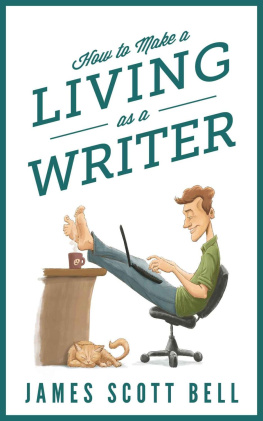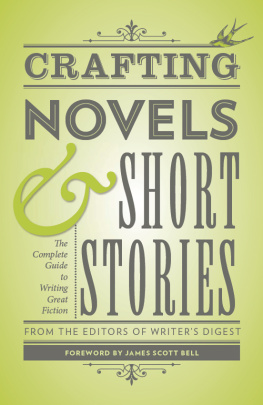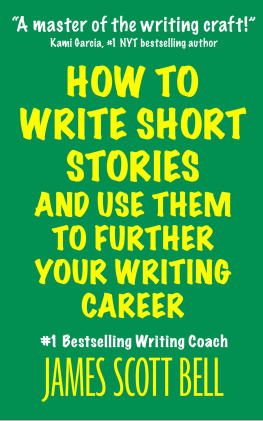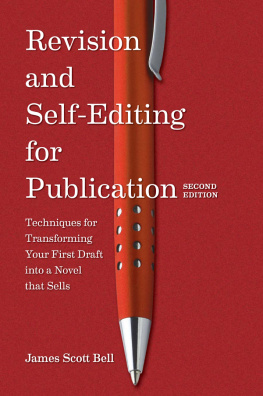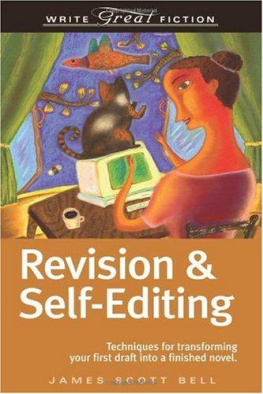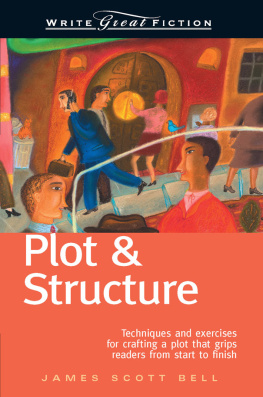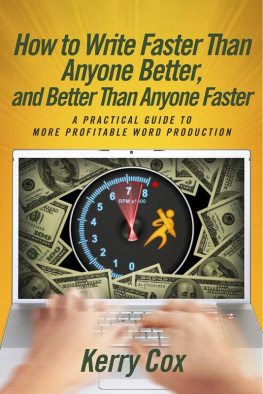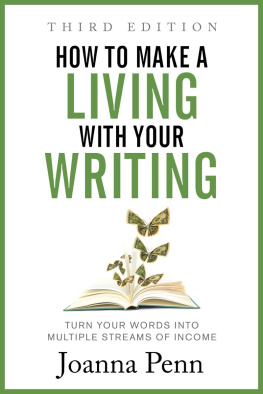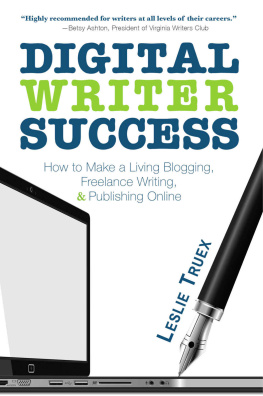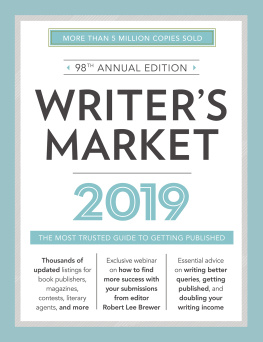Table of Contents
How to Make a Living as a Writer
James Scott Bell
Copyright 2014 by James Scott Bell
All rights reserved
Compendium Press
P.O. Box 705
Woodland Hills, CA 91365
Cover design by Josh Kenfield
1. Why I Wrote This Book
Let's get one thing straight from the jump. I have this quaint notion that it's okay for writers to make money from their writing. Maybe even make a living.
Astounding, I know. But I believe it. And celebrate it.
Because for most of human history the vast majority of writers have been lucky to make lunch money from their scribblings. Very few have been able to support themselves from the quill or the keyboard alone.
But that's all changed.
I've been writing for my bread for almost twenty years now. Writing is the only profession I ever really wanted to pursue. I got sidetracked into law for a while. That's because I didn't think I had what it takes to be a writer.
In college I got to be in a workshop with Raymond Carver, and quickly realized I couldn't just sit down and write beautiful prose. I thought that's what you had to be able to do if you were a true writer.
The people around me kept saying writing was not something you could learn. You especially couldn't learn it from craft books, which were sniffed at by the cognoscenti as a waste of money.
I believed that flapdoodle for about ten years.
But the writing bug came back to me with a vengeance. I knew I had to try to learn to write fiction, even it was futile, because that's what I wanted to do with my life.
And lo and behold, I found out the naysayers were dead wrong.
You Can Learn What You Need to Know
On September 15, 1990, I wrote these words in my journal:
EPIPHANY!
Light! A bulb! A flash! A revelation! My muse on fire!
I feel like I've suddenly "clicked into" how to write... I mean, everything I've been reading and brooding about has finally locked. There is this tremendous rush of exhilaration. It just happened, and now I feel like everything I write will be at least GOOD, but can also be EXCELLENT.
I was writing screenplays at the time and I'd written five or six over two years without much encouragement, let alone success. But the next one I wrote was optioned and got me into an agency. I optioned other scripts, too, and did some assignment work (including a treatment for the late, great Whitney Houston). But when the projects didn't get pushed up the ladder (an old Hollywood story) I got frustrated and wrote a novel using the same revealed wisdom. The novel sold. Then I wrote a legal thriller and got a five-book contract. My career as a novelist was launched.
And all of it I trace back to that epiphany.
Which carries an important lesson for those who desire to make a go of a writing career: you can learn what you need to know.
And you can know enough to have a real shot at making a living at this or, at least, create a healthy stream of income that can keep on flowing and growing.
More writers are making real dough than at any time in the history of the written word. The digital revolutionwhich began on November of 2007 with the introduction of the Kindlehas given innumerable writers a whole new way to grow abundant lettuce in their literary gardens.
What I want to give you in this book are the creative and business principles that have worked for me and other successful writers I've observed. But what I need to make clear now is that none of this is a get-rich-quick proposition. While there have been some fabulous monetary successes of late, in both traditional and self-publishing, it's never been easy to support oneself by writing alone.
In what's called the Pulp era, roughly 1920 - 1950, many writers put food on the table being prolific providers of stories. Most of them lived modestly in order to write full time. It was hard work, but they saw it as a job like any other.
When the "slick" magazines took off in the 1950s, a new breed of writer, the freelancer, sprang up. Working just as hard as their pulp cousins, they made their living by coming up with article ideas by the truckload, querying multiple magazines on a daily basis, and making relationships with editors as a means of securing future assignments.
Both the pulp and freelance writers would try to turn some of their material into books. When these got published, it was another source of income.
None of this was easy work. But it was writing, and that's what they wanted to do.
Every now and then one of these writers would have a breakout success that actually did lead to what many would call wealth. It's happening today, too, though it's rare. It may even happen for you, but don't go into this expecting that you'll go real estate shopping in The Hamptons. If it happens, great. Invite me to the housewarming.
But if you want to make a living or at least a substantial part of a living off of your writing, get ready to work for it. I want to help you work smart. I want to increase your chances of making good in this game.
Did I say game? Yes. You've got to look at it that way. It's part skill and part chance. If you up your skill and take more chances, your odds of success increase.
There's a lot of chatter these days about writing success being like a lottery. Something about that metaphor has always bothered me. For in a true lottery you can't affect your odds (except by buying more tickets, of course). But is that true for writers?
I don't think it is. Just putting more books out there ("buying more tickets") won't help your chances if the books don't generate reader interest and loyalty. Productivity is a virtue, but to that must be added value.
Hugh Howey, one of the most successful self-publishing writers out there, had some interesting thoughts on timing and luck on his blog of March 17th, 2014 (see HughHowey.com). Citing Malcolm Gladwell's book Outliers, Howey highlighted a fascinating factoid:
A list of the 75 wealthiest people in history, which goes all the way back to Cleopatra, shows that 20% were Americans born within 9 years of each other. Between 1831 to 1840, a group that includes Rockefeller, Carnegie, Armour, J.P. Morgan, George Pullman, Marshall Field, and Jay Gould were born. They all became fabulously wealthy in the United States in the 1860s and 1870s, just as the railroad and Wall Street and other industries were exploding.
From this Howey explains how he benefitted from being in the right place at the right time, Kindle-wise. He had started writing in earnest in 2009, just as the neo-self-publishing movement was taking off. He did some things right, like early adoption of KDP Select and serialization. Look at him now.
But there is one thing he says I disagree with: "I know I'm not that good."
Wrong. He is good. Very good. Wool would not be what it is without the quality. Which Howey has worked hard to achieve.
Reminds me of the old adage, "Luck is where hard work meets opportunity." I believe that wholeheartedly.
Skill Increases Your Odds
So I wouldn't call the publishing biz a lottery system. What metaphor would I use? It hit me one day: writing success is more like my favorite game, backgammon.
Backgammon, which has been around for 5,000 years, is brilliantly conceived. Dice are involved, so there's always an element of chance. Someone who is way behind still might win if the dice give him a roll he needs at a crucial moment.
On the other hand, someone who knows how to think strategically, can calculate odds, and takes risks at the right time will win more often than the average player who depends mostly on the rolling bones.
Early on I studied the game by reading books. I memorized the best opening moves for each roll. I learned how to think about what's called the "back game," what the best "points" are to cover, and when it might pay off to leave a "blot."

